Lehman Shock and its impact on corporate IP management practices
The collapse of Lehman Brothers in the fall of 2008, which had been triggered by the sub-prime mortgage loan problem in the United States, set off a global financial crisis and dealt a severe blow to the Japanese economy that is heavily dependent on demand in the U.S. and Europe. Meanwhile, despite the prolonged stagnation of the world economy, China and other emerging economies have managed to maintain steady growth. Against this backdrop, many Japanese companies have shifted their management resources away from the stagnant domestic market and moved to emerging markets in Asia in order to further expand business in those markets. This tendency is also observable in corporate behavior via practices in the management of intellectual property (IP).
According to the survey conducted by the Japan Patent Office, the number of patent applications filed by Japanese companies decreased by about 10% between 2008 and 2009, that is, before and after the collapse of Lehman Brothers, as well as the number of patent examination requests.
In a bid to identify factors that brought about such changes in corporate IP management practices, the Research Institute of Economy, Trade and Industry (RIETI), with the help of the Japan Intellectual Property Association (JIPA), conducted a questionnaire survey of Japanese companies' IP management practices in May 2010. The survey covered the top 200 companies ranked by the number of patent applications filed and 69% of them responded. In what follows, I would like to present an overview of the survey results. (The detailed report on the survey findings, including the breakdown of data, can be found in a separate paper.)
(1) To begin with, 65% of the companies that responded to the survey said that the number of patent applications they filed with the JPO in 2009 "somewhat decreased" or "significantly decreased" (down by an average of 10% or more per year) compared to 2007, while 68% said that they filed fewer examination requests in 2009 than in 2007. In particular, regarding the filing of examination requests, more than 50% reported a significant decrease and almost none reported an increase, probably because of substantial costs involved.
(2) As a general trend, the number of patent applications filed overseas decreased along with that of domestic patent applications. Even so, the number of companies that reported a decrease is fewer in terms of percentage. It should be also noted that the number of international patent applications filed under the Patent Cooperation Treaty (PCT) and the number of patent applications filed in China increased at about 20% of the companies surveyed.
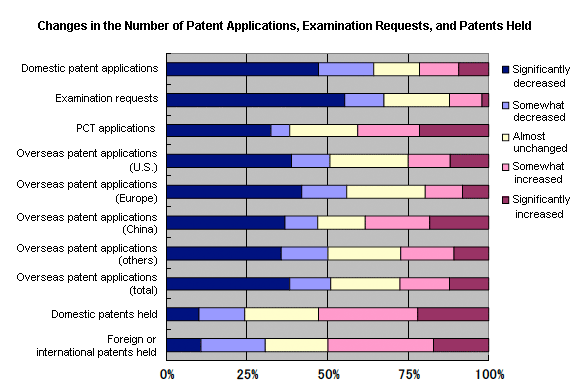
(3) There were 90 companies that filed fewer patent applications in Japan. Asked to identify reasons for fewer filings, more than 30 of those companies pointed to a decrease in research and development (R&D) expenditures, and just as many cited a decrease in expenditures for IP-related activity due to declining corporate earnings. At the same time, however, 50 companies said that a more extensive prior-art search, performed for the purpose of achieving high quality patents, resulted in a shorter list of inventions worth patenting, while 20 companies said that the number of domestic patent filings decreased because they abolished the quota system in place for their researchers and engineers with regard to patent filings, and adopted a policy to file patent applications only for strategically important inventions. This indicates that, even though motivated by declining corporate earnings, Japanese companies have become more selective in seeking patents, filing patent applications only when the invention is truly novel and likely to lead to a strong patent - one that is surely enforceable against infringement - or when obtaining a patent for an invention that is absolutely necessary for business. Meanwhile, in a somewhat disturbing finding, some companies - though less than 20 - said that although their R&D expenditures remain unchanged, fewer patentable inventions were produced. We should take note that this may be an indication of a decline in the efficiency of R&D activities.
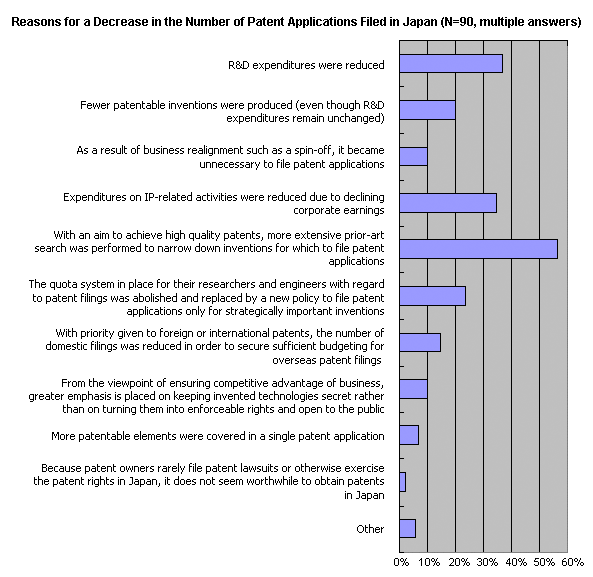
(4) Only 30 companies, or 20% of the respondents, said the number of domestic filings increased. Asked about the reasons for the increase, they said that: the number of patent filings is important because it signifies the level of their technological capabilities (14 companies); they wanted to secure patents in Japan as a step toward achieving the ultimate goal of establishing a global technological standard (13 companies); and they believe that patent filing in Japan provides a basis for overseas patent filing (11 companies). These responses indicate that each of those companies has a long-term patent strategy.
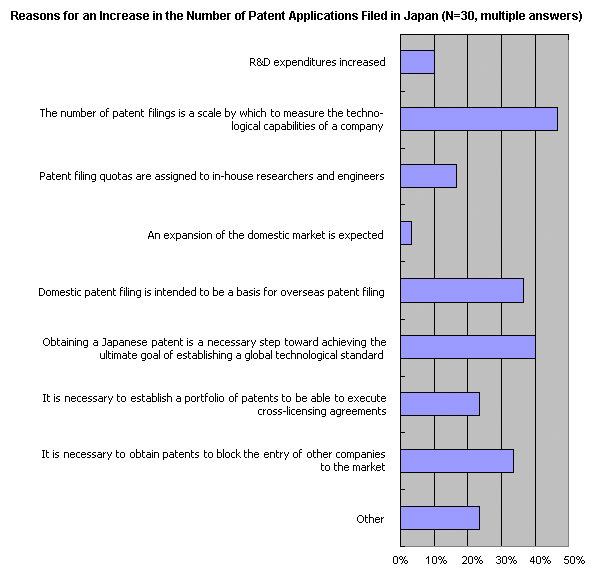
(5) The ratio of patent applications filed overseas to total patent applications increased at 38% of the respondent companies, remained unchanged at 28%, and decreased at 34%. The biggest reason for an increase in the ratio of overseas patent filings was that they put greater importance on patent filings in emerging economies such as China. From this, it is observed that those companies have been expanding overseas' IP-related activity in proportion to the expansion of their global business operations in the emerging markets.
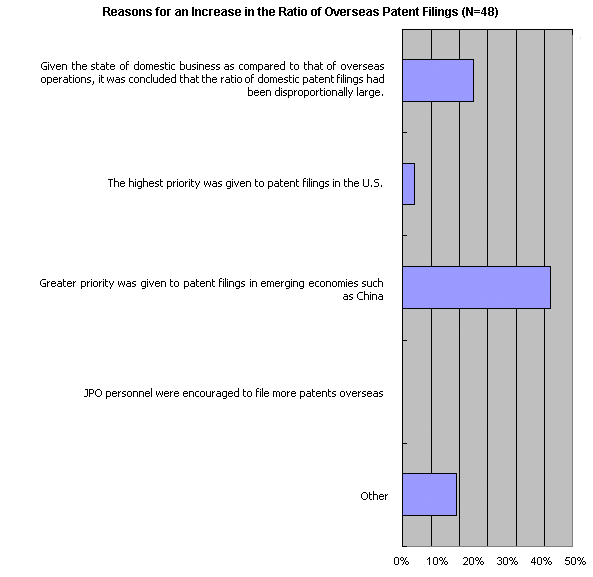
(6) Lastly, let's take a look at what are companies' prospects for this fiscal year (FY 2010) as compared to FY 2009. The number of domestic patent filings is expected to remain unchanged in 77 companies or well more than half the 139 companies that responded, increase in 45 companies, and decrease in 16 companies. In contrast, of the 138 companies that responded to the same question regarding overseas filings, 65 companies expect an increase, followed by 64 companies that expect the number of filings to be unchanged, while only eight companies expect a decrease. It is thus expected that the overseas shift in patent filings will likely continue through FY 2010.
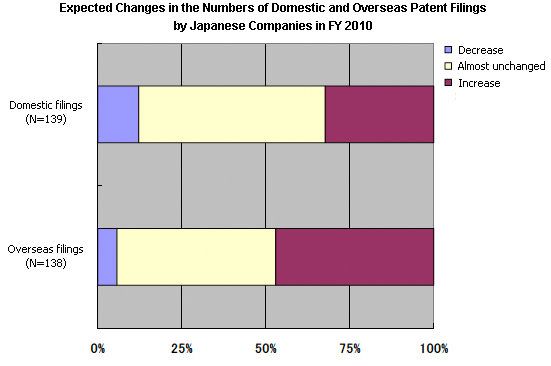
Tendencies in IPR-related activities as illustrated by survey findings
From the survey findings discussed above, we can see the following two tendencies in Japanese companies' IPR-related activities: 1) suppression in the number of domestic filings mainly attributable to an increased emphasis on the quality of patent applications, and 2) increase in the number of overseas patent filings. Given the fact that examiners' decision to grant a patent has been taken only for 50% of domestic patent applications, companies' move to restrain the number of domestic filings is to some extent reasonable. They would also need to secure funds for overseas filings by paring expenditures related to domestic filings. At the same time, however, encouraging patent filings has positive effects, for instance, in terms of improving the motivation of in-house researchers and publicizing technological competence of the company. Thus, going forward, Japanese companies are likely to consider these factors, as they become more selective and focused in filing patent applications in Japan. Meanwhile, the tendency of increasing the number of overseas patent applications will likely continue in the future, as many Japanese companies are expected to shift R&D functions - in addition to manufacturing functions - to China and other emerging markets in Asia.


